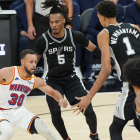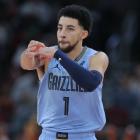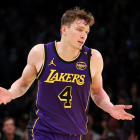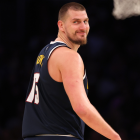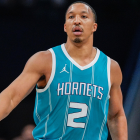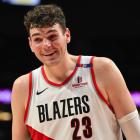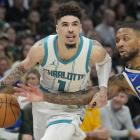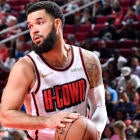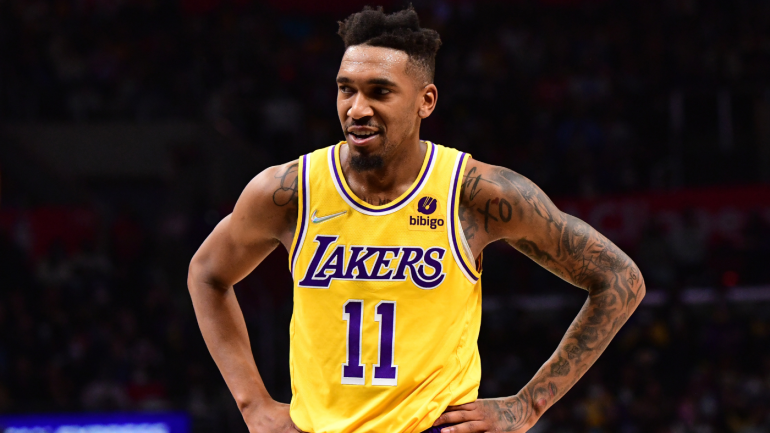
The Los Angeles Lakers have plenty of players that are making too much money. Kendrick Nunn is earning $5 million this season without having played in a single game thanks to the taxpayer mid-level exception. Talen Horton-Tucker is making nearly twice as much after the Lakers re-signed him using Early Bird Rights. Russell Westbrook is making more than $44 million thanks to the supermax extension he signed all the way back in his Oklahoma City days. But none of them have been as meaningful to the Lakers this season as the one player on their roster who is actually making too little money.
No, this is not a case of Malik Monk out-performing his contract, though he certainly has. Most teams would eagerly accept starting-caliber basketball for the minimum salary. The problem for the Lakers is that Monk is just 24 years old and they'd presumably like to keep him for the long haul. The fact that he's making only the minimum this season is going to make that extremely difficult.
Monk signed only a one-year contract with the Lakers last summer. When a player becomes a free agent after only one year with a team, that team only gains Non-Bird Rights on that player. Those rights allow the team to go above the cap to re-sign that player, but only to give him a 20 percent raise. Most players are happy to earn a 20 percent raise… but a 20 percent raise on the minimum is, well, minimal. Monk isn't even making $1.8 million this season. He's not going to stay in Los Angeles for the roughly $2.15 million those Non-Bird Rights can get him. Teams are going to offer him several times more.
So how can the Lakers retain Monk? In a perfect world, they'd like to get his full Bird Rights. When a team has full Bird Rights on a player, they can pay him anything up to the max to stay with him. It takes three years to build those rights, though, and keeping Monk in-house that long when he'll receive more lucrative offers in the process seems relatively unlikely. Fortunately, there's a possible compromise here.
If the Lakers can keep Monk in the building for one more season, they'll gain his Early Bird Rights, a middle ground between the Non-Bird Rights they'll have and the full Bird Rights they'd want. Early Bird Rights allow a team to re-sign a player for 105 percent of the average player salary—the figure used to determine the non-taxpayer mid-level exception. Such a deal would pay Monk something in the neighborhood of $50 million over four years. Perhaps more if the cap projections are optimistic.
That sort of contract is far closer to Monk's true value than the minimum, but how can the Lakers compel Monk to wait an extra year in Los Angeles to get the necessary Early Bird Rights? The only feasible answer right now would be the taxpayer mid-level exception. The Lakers could, in theory, sign Monk to a two-year deal worth roughly $13 million using that exception. The second season would include a player-option, giving Monk the freedom to either opt-out and test free agency (hopefully re-signing with the Lakers using that Early Bird Exception), or, if things go poorly next season, opt-in and try again with the knowledge that he would have Full Bird Rights with the Lakers after that.
Is this going to be enough to retain Monk? That's hard to say. Fortunately for the Lakers, very few teams are going to have meaningful cap space this offseason. Detroit, San Antonio and Orlando are the three teams likely to have real space, but all three have invested in multiple young guards over the past few years. None appear especially likely to pursue Monk. A more present threat would be some team offering Monk the non-taxpayer mid-level exception. A bigger group of teams should have access to that exception if they want it, and taking such an offer could guarantee Monk something like $45 million over four years.
That's life-changing money, and Monk hasn't gotten a big contract yet. If his priority this offseason is to maximize earnings above all else, the Lakers are probably out of luck. If he's happy in Los Angeles and wants to wear the purple and gold for the long haul, though, he has a path to doing so if he's patient. It's hardly an unprecedented path either. Bobby Portis took a very similar route to remain with the Milwaukee Bucks this offseason. Nic Batum took his Non-Bird 20 percent raise to stay with the Clippers, but like Portis, he'll have the chance to cash in on an Early Bird deal in the offseason. As an added bonus, players waiting for Early Bird Rights in this way have the right to veto trades for a year.
But if someone offers Monk the full non-taxpayer mid-level exception, the Lakers will have almost no recourse to match that offer. So long as LeBron James and Anthony Davis remain on the roster, it would be impractical for them to operate below the salary cap even if they could trade Russell Westbrook away and create the necessary space. One long shot that would be more trouble than it's worth would be to convince Westbrook to opt-out of his contract and re-sign a longer-term extension with a lower salary next season. If his cap number dips low enough, the Lakers could potentially create enough flexibility to use the heftier non-taxpayer mid-level exception themselves and offer Monk that same deal in the $45 million range right away. This, of course, would be a bad idea because it would mean committing multiple seasons to Westbrook.
In the end, that is going to put the ball in Monk's court. If he wants to be a Laker, there is a way for him to stay put and position himself for a fair contract down the line. He'd just have to be patient enough to wait out that extra year in order to get it.










